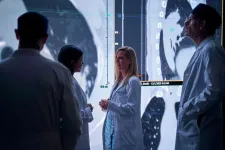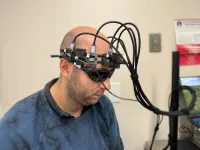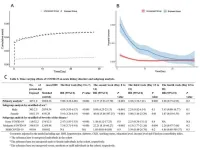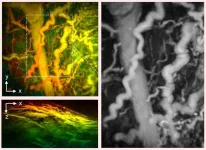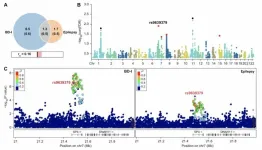(Press-News.org) WASHINGTON, September 30, 2024 — Researchers looking to de-intensify radiation treatments for people with early-stage, HPV-associated oropharyngeal cancer to prevent long-term side effects halted a large, randomized phase II/III trial after patients in the control arm reached a record high, two-year progression-free survival rate of 98%. De-intensified treatments involving a lower radiation dose and immunotherapy in place of chemotherapy did not perform as well as the more rigorous chemoradiation approach. Findings of the NRG Oncology HN005 trial will be presented today at the American Society for Radiation Oncology (ASTRO) Annual Meeting.
“In cancer treatment, 98% progression-free survival at two years is a number you just don’t see,” said Sue S. Yom, MD, PhD, FASTRO, principal investigator of the trial and the Irwin Mark Jacobs and Joan Klein Jacobs Distinguished Professor in Head and Neck Cancer Radiation Oncology at the University of California, San Francisco. “It’s the highest that has ever been published in the literature for head and neck cancer, and in and of itself, it is strong evidence that modern chemoradiation therapy is highly effective for these patients.”
“Deintensification of chemoradiation treatments for HPV-associated oropharyngeal cancers is of very high interest to patients and researchers, but our study makes clear that these approaches should remain very experimental. Further work needs to be done to find ways that we can reduce side effects while maintaining these extremely high cure rates,” she said.
Oropharyngeal cancer is a type of head and neck cancer that affects the middle part of the throat. An estimated 70% or more of newly diagnosed cases of oropharyngeal cancer in the U.S. are caused by the human papillomavirus (HPV), and incidence rates of HPV-related disease are increasing rapidly in most developed nations, including the U.S. It is the most common HPV-related cancer for men, and the second most common for women, following cervical cancer.
People diagnosed with HPV-associated oropharyngeal cancers tend to be younger — the average age at diagnosis in the U.S. is 55 — and typically have much better outcomes than those with throat cancer caused by tobacco or alcohol use. Radiation therapy is an especially effective treatment for tumors caused by HPV, which are more radiosensitive and therefore typically more responsive to treatment, and it can be used as a standalone treatment or combined with systemic therapy and/or surgery. But many patients experience severe side effects during treatment, and a smaller number also experience long-term side effects from chronic inflammation and tissue damage that can arise up to two decades later, including difficulty swallowing or recurring infections of the soft tissue in the mouth and throat.
“Now that our chemoradiation treatments have improved to this point, we have a substantial number of patients surviving for longer durations, and we are starting to understand their experiences at very late follow-up,” Dr. Yom said. “The new challenge when treating these patients is how to keep them healthy and well for 25 or 35 years. We know that there is a minority of these patients who will have negative effects many years later.”
In this study, Dr. Yom and her team tested two lower-intensity treatment regimens against a control arm of more standard chemoradiation for people with HPV-associated, locoregionally advanced oropharyngeal squamous cell carcinomas. A total of 382 patients were randomly assigned to one of three treatment arms: (1) usual radiation dosing (70 Gy total mildly accelerated over six weeks) combined with cisplatin chemotherapy; (2) a reduced radiation dose (60 Gy total over six weeks) combined with cisplatin; and (3) a reduced radiation dose (60 Gy total mildly accelerated over five weeks) combined with an immunotherapy drug, nivolumab, in place of chemotherapy. All patients received intensity modulated radiation therapy, and most were male (90.6%), white (87.5%) and never-smokers (79.4%).
The phase II trial was designed to trigger a futility analysis for each experimental arm after a predetermined number of patients experienced disease progression. These tests showed that neither de-intensified treatment approach met the threshold for non-inferiority compared to the standard treatment, however, and the trial was closed early.
“In very rigorous testing, those experimental arms did not produce equivalent results to the control arm,” said Dr. Yom. “The experimental arms were close to meeting their expected goals, but the patients treated on the control arm had such incredible results that we had an ethical responsibility to halt the study. I believe we have to take stock of this new benchmark and that new trial designs for this disease will need to account for this result.”
With a median follow-up of 2.2 years, the two-year PFS estimates were 98.1% following treatment on the control arm, 88.6% after reduced radiation with chemotherapy and 90.3% after reduced radiation with immunotherapy. The two-year overall survival estimates were 99%, 98% and 96.1%, respectively.
“I think this study is a good reminder that patients with this disease have really outstanding cure rates after we treat them with contemporary chemoradiation,” Dr. Yom said. “At this point, neither of the deintensification options we tested would be appropriate for standard of care use, because you would actually be changing some patients’ chance for a cure.”
“This remains a work in progress, however. Most patients diagnosed with HPV-positive oropharyngeal cancer have a very long life trajectory ahead of them. As researchers, our focus now should be on identifying which patients can benefit from these newer paradigms, and then finding a more personalized therapy that works for each of these different groups of patients. The future goal would be that each patient gets what they need, but no more than what they need.”
###
Attribution to the American Society for Radiation Oncology (ASTRO) Annual Meeting is requested in all coverage.
Study/Presentation Details
Abstract LBA 03: Interim futility results of NRG-HN005, a randomized, phase II/III non-inferiority trial for non-smoking p16+ oropharyngeal cancer patients
News Briefing: Monday, September 30, 10:00 a.m. Eastern time. Details here. Register here.
Scientific Presentation: Monday, September 30, 2:00 p.m. Eastern time, Walter E. Washington Convention Center. Email press@astro.org to access the livestream or recording.
This study was supported by funding from the National Cancer Institution and Bristol-Myers Squibb.
ABOUT ASTRO
The American Society for Radiation Oncology (ASTRO) is the largest radiation oncology society in the world, with more than 10,000 members who are physicians, nurses, biologists, physicists, radiation therapists, dosimetrists and other health care professionals who specialize in treating patients with radiation therapies. Radiation therapy contributes to 40% of global cancer cures, and more than a million Americans receive radiation treatments for cancer each year. For information on radiation therapy, visit RTAnswers.org. To learn more about ASTRO, visit our website and follow us on social media.
END
Existing standard chemoradiation superior to deintensification approaches for HPV-related oropharyngeal cancer
Randomized trial halted after two deintensification strategies failed to match standard of care’s 98% rate of two-year progression-free survival
2024-09-30
ELSE PRESS RELEASES FROM THIS DATE:
CAR-T safe and effective on an outpatient basis in community hospitals
2024-09-30
(WASHINGTON – September 30, 2024) In the largest prospective study to date examining the use of chimeric antigen receptor (CAR)-T therapy in a community setting on an outpatient basis, patients with relapsed or refractory large B-cell lymphoma (LBCL) responded well to treatment with few serious side effects, according to results published today in Blood Advances.
LBCL is a cancer affecting B lymphocytes, a type of white blood cell. It can progress rapidly and is fatal if untreated, although most forms of LBCL respond well to standard ...
City of Hope to present leading-edge radiotherapy treatments for people with lung, genitourinary and blood cancers at the American Society for Radiation Oncology Annual Meeting
2024-09-30
LOS ANGELES — City of Hope®, one of the largest and most advanced cancer research and treatment organizations in the U.S. and ranked among the nation’s top 5 cancer centers by U.S. News & World Report, is part of today’s press conference program at the American Society for Radiation Oncology (ASTRO) Annual Meeting, where a renowned City of Hope radiation oncologist will present phase 3 clinical trial data showing that people with limited-stage small cell lung cancer may benefit from adding immunotherapy to chemoradiation, but not if both treatments are given at the same time. The results suggest that the timing of when immunotherapy is given plays a key role in its ...
A new and unique fusion reactor comes together with PPPL's contributions
2024-09-30
Like atoms coming together to release their power, fusion researchers worldwide are joining forces to solve the world’s energy crisis. Harnessing the power of fusing plasma as a reliable energy source for the power grid is no easy task, requiring global contributions.
The Princeton Plasma Physics Laboratory (PPPL) — a U.S. national laboratory funded by the Department of Energy (DOE) — is leading several efforts on this front, including collaborating on the design and development of a new fusion device at the University of Seville in Spain. The SMall Aspect Ratio Tokamak (SMART) strongly ...
Reduced risk of serious cardiovascular disease after COVID vaccination
2024-09-30
People who have been fully vaccinated against COVID-19 have a significantly lower risk of developing more severe cardiovascular conditions linked to COVID-19 infection, according to a nationwide study at the University of Gothenburg. At the same time, some cardiovascular effects are seen after individual doses of the vaccine.
The COVID-19 vaccine aims to reduce complications and overall mortality from the disease. At the same time, some cardiovascular effects have been seen after individual doses of the vaccine. A rare acute side effect is inflammation of the cardiac muscle or the pericardium in young men following mRNA vaccination. In terms of other cardiovascular ...
New laser-based headset can measure blood flow, assess risk of stroke
2024-09-30
When physicians want to know more about a patient’s risk of cardiovascular disease, they can order a cardiac stress test. But when it comes to risk of stroke, there is no equivalent scalable and cost-effective test of the brain’s function to help physicians counsel patients on their potential risk. A questionnaire that asks patients about contributing risk factors is currently the best tool for estimating such risk.
Now a team of engineers and scientists from Caltech and the Keck School ...
Researchers close in on understanding possible cause of Alzheimer’s disease
2024-09-30
CLEVELAND—With a four-year, $3.3 million grant from the National Institutes of Health (NIH), researchers from Case Western Reserve University will study whether certain brain proteins may play a role in the development of Alzheimer’s disease.
Alzheimer’s disease is a brain disorder that slowly destroys memory and thinking skills. According to the Alzheimer’s Association, nearly 7 million Americans 65 and older are living with the disease and there are more deaths from Alzheimer’s than breast and prostate cancer combined.
Previous research has ...
New synthesis strategy could speed up PFAS decontamination
2024-09-30
HOUSTON – (Sept. 30, 2024) – Rice University engineers have developed an innovative way to make covalent organic frameworks (COFs), special materials that can be used to trap gases, filter water and speed up chemical reactions. COFs have the potential to address significant environmental challenges, including energy storage and pollution control. An example of that is their potential use in the decontamination of “forever chemicals” or per- and polyfluoroalkyl substances (PFAS).
Rice chemical engineer Rafael Verduzco and his team have described a new way to synthesize high-quality ...
COVID-19 linked to increased risk of acute kidney disorders: New study reveals time-varying effects
2024-09-30
Researchers from West China Hospital, Sichuan University, have conducted a study revealing a significant association between COVID-19 and acute kidney disorders (AKD), including acute kidney injury (AKI), that varies over time. The study, led by Dr. Li Chunyang and Dr. Zeng Xiaoxi from the West China Biomedical Big Data Center, was recently published in the journal Health Data Science.
COVID-19, known for its impact on the respiratory system, also affects other organs, including the kidneys. The study aimed to investigate the time-dependent effects of COVID-19 on acute kidney disorders. Using data from the ...
Medical imaging breakthrough could transform cancer and arthritis diagnosis
2024-09-30
A new hand-held scanner developed by UCL researchers can generate highly detailed 3D photoacoustic images in just seconds, paving the way for their use in a clinical setting for the first time and offering the potential for earlier disease diagnosis.
In the study, published in Nature Biomedical Engineering, the team show their technology can deliver photoacoustic tomography (PAT) imaging scans to doctors in real time, providing them with accurate and intricate images of blood vessels, helping inform patient care.
Photoacoustic ...
Genetic link between bipolar disorder and epilepsy unveiled in groundbreaking study
2024-09-30
Kunming, China - A team of researchers from the Chinese Academy of Sciences has uncovered compelling evidence of a genetic link between bipolar disorder type I (BD-I) and epilepsy, potentially revolutionizing our understanding of these complex neuropsychiatric conditions. The study, published in Genomic Psychiatry on September 30, 2024, reveals shared genetic variants and a causal relationship between the two disorders, opening new avenues for research and treatment.
Led by Dr. Ming Li from the Kunming ...
LAST 30 PRESS RELEASES:
Study finds early imaging after pediatric UTIs may do more harm than good
UC San Diego Health joins national research for maternal-fetal care
New biomarker predicts chemotherapy response in triple-negative breast cancer
Treatment algorithms featured in Brain Trauma Foundation’s update of guidelines for care of patients with penetrating traumatic brain injury
Over 40% of musicians experience tinnitus; hearing loss and hyperacusis also significantly elevated
Artificial intelligence predicts colorectal cancer risk in ulcerative colitis patients
Mayo Clinic installs first magnetic nanoparticle hyperthermia system for cancer research in the US
Calibr-Skaggs and Kainomyx launch collaboration to pioneer novel malaria treatments
JAX-NYSCF Collaborative and GSK announce collaboration to advance translational models for neurodegenerative disease research
Classifying pediatric brain tumors by liquid biopsy using artificial intelligence
Insilico Medicine initiates AI driven collaboration with leading global cancer center to identify novel targets for gastroesophageal cancers
Immunotherapy plus chemotherapy before surgery shows promise for pancreatic cancer
A “smart fluid” you can reconfigure with temperature
New research suggests myopia is driven by how we use our eyes indoors
Scientists develop first-of-its-kind antibody to block Epstein Barr virus
With the right prompts, AI chatbots analyze big data accurately
Leisure-time physical activity and cancer mortality among cancer survivors
Chronic kidney disease severity and risk of cognitive impairment
Research highlights from the first Multidisciplinary Radiopharmaceutical Therapy Symposium
New guidelines from NCCN detail fundamental differences in cancer in children compared to adults
Four NYU faculty win Sloan Foundation research fellowships
Personal perception of body movement changes when using robotic prosthetics
Study shows brain responses to wildlife images can forecast online engagement — and could help conservation messaging
Extreme heat and drought at flowering could put future wheat harvests at risk
Harlequin ichthyosis: a comprehensive review of pathogenesis, diagnosis, and management
Smithsonian planetary scientists discover recent tectonic activity on the Moon
Government censorship of Chinese chatbots
Incorporating a robotic leg into one’s body image
Brain imaging reveals how wildlife photos open donor wallets
Wiley to expand Advanced Portfolio
[Press-News.org] Existing standard chemoradiation superior to deintensification approaches for HPV-related oropharyngeal cancerRandomized trial halted after two deintensification strategies failed to match standard of care’s 98% rate of two-year progression-free survival
